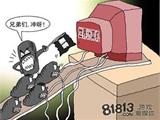The e-commerce path for traditional enterprises is becoming increasingly clear.
Regarding the issue of traditional enterprises stepping into the e-commerce domain, many industry insiders have predicted that the path for traditional enterprises to go digital is not smooth, and choosing to outsource e-commerce services might be more convenient. From the current situation, this prediction is gradually becoming a reality, including customer service software.
1. The trend of traditional enterprises going digital is becoming increasingly evident
The number of internet users in our country continues to grow, making it the largest internet market in the world. According to CNNIC's survey report, as of June 2011, the total number of internet users in our country reached 485 million, with an internet penetration rate of 36.2%, which increased by 1.9 percentage points compared to the end of last year. Such a huge market cannot be ignored by traditional enterprises.
Our internet infrastructure is also improving day by day. Recently, there has been constant news about the construction of optical network cities, high-speed internet upgrades initiated by large cities such as Shanghai and Beijing, and the news of decreasing fees from telecom and Unicom under the background of anti-monopoly investigations. All these factors allow for the continued high-speed growth of our internet base and users, and make various internet applications possible under the support of high-speed bandwidth. These conditions provide strong support for traditional enterprises entering the e-commerce field.
The online shopping market, which e-commerce concerns the most, has also experienced rapid development. It is estimated that the scale of online shopping in our country will reach 569 billion yuan in 2011, and in the next 5-10 years, it will account for 30% of the total consumption. Such a huge potential market share attracts traditional enterprises to accelerate and increase their investment in e-commerce.
Considering the above three driving forces, according to surveys, 80% of traditional enterprises have already recognized the promoting effect of e-commerce on their business, a significant increase compared to a year ago.
2. The difficulties of traditional enterprises going digital are still evident
A clear trend does not mean that the road for traditional enterprises to go digital will be smooth. The difficulties faced by traditional enterprises in digitalization still exist and have not been significantly improved.
Traditional enterprises usually divide their digitalization efforts into three levels. One level is knowing the benefits of e-commerce, so they build websites, establish online product display systems, use the website as one of their windows, and let the company's network administrator manage the website and handle basic updates. For business contacts, they rely entirely on the telephone provided in the "Contact Us" section of the website. Online customer service, this is what most large enterprises refer to as e-commerce; the second level adds some interactive elements on top of the first level, such as providing a message board function, offering the company’s email contact information, and assigning a specific person from the sales department, marketing department, or office to regularly reply to messages and collect emails; the third level provides a network sales model, at least allowing complete product inquiries on the website, and even allowing orders to be placed directly on the website. There is a dedicated department within the company responsible for the operation of e-commerce.
Currently, the vast majority of traditional enterprises' e-commerce efforts are still at the first or second level. The fundamental reason lies in the lack of marketing, technical, and operational talents required by the e-commerce channel, which is an unavoidable shortcoming for traditional enterprises. Once too much is invested in the e-commerce field, it often leads to the outcome of large investment but slow results, eventually leading to nothing.
Therefore, traditional enterprises often find it difficult to decide whether to independently build and operate e-commerce businesses, or just build websites without operating them, or only operate without building websites.
3. E-commerce service outsourcing becomes a trend for traditional enterprises going digital
It is precisely because of the difficulties faced by traditional enterprises in their digitalization journey that a new emerging e-commerce outsourcing industry has been born. By completely outsourcing the company's e-commerce operations to professional e-commerce outsourcing companies, not only can they quickly seize the e-commerce market, but they can also avoid the consequences of slow speed and poor efficiency caused by insufficient capabilities and talents, making it the preferred choice for many traditional enterprises to go digital.
And it is precisely because of the urgent needs of traditional enterprises that a large number of e-commerce outsourcing companies have emerged domestically. Many previous website construction companies have also raised the banner of online marketing and e-commerce outsourcing. The e-commerce outsourcing industry also has uneven quality, which poses certain obstacles for traditional enterprises when choosing e-commerce outsourcing.
When choosing e-commerce outsourcing, traditional enterprises should select those that have been operating in the e-commerce outsourcing industry for many years, have numerous successful cases and experiences, and have good market reputations. Of course, if they choose industry-leading enterprises, the risk is smaller. For example, Xingchangxinda, a company we are familiar with, has been in the industry for 10 years, successfully operated many world-renowned brands, and now has a market share of 60% in the industry.
In summary, the trend of traditional enterprises going digital is becoming increasingly evident. Website online customer service and digitalization have become a must for enterprises. Choosing a trustworthy e-commerce outsourcing company for outsourcing has become a shortcut for most traditional enterprises to go digital. With the gradual flattening and broadening of the road for traditional enterprises to go digital, e-commerce will play a powerful role in promoting the secondary development of traditional enterprises.



